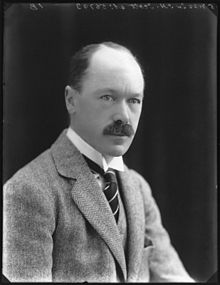|
Samuel Haslam Scott
Sir Samuel Haslam Scott, 2nd Baronet (7 August 1875[1] – 26 June 1960[2]) was a businessman, author, philanthropist and important figure in the history of the National Trust in the Lake District. LifeSamuel Scott was schooled privately and went to university at Oriel College, Oxford receiving a B.A. and M.A. by 1902.[1] Initially, he had little interest in the family insurance business and his father considered buying him a country estate, but this later changed.[3] Samuel Scott was a director of The Provincial Insurance Company from 1903 until he died in 1960 and chairman from the death of his father in 1913 to 1946. Before the first world war Scott had wanted to move the headquarters of The Provincial to Westmorland to benefit his wife Carmen's health and be closer to friends but this was vetoed by his father James. Samuel moved to Bowness but spent a lot of time in Bolton running the company, particularly during the war.[4] Due to the ill health of his brother Francis, the official managing director, from 1913 to 1920 Samuel was effectively the manager of the Provincial[5] but he moved out of daily management of the company in the 1920s. The head office of The Provincial moved to Kendal and shortly after the end of the war employed fifty people.[6] It subsequently grew significantly. During the 1920s Scott significantly diversified his activities, becoming a board member of a publisher in London, writing books, taking senior roles in local agricultural societies and in 1926 becoming High Sheriff of Westmorland.[7] He also showed his Rough Fell sheep at local shows. He became a Justice of the Peace in 1927.[2] He was an active member of the Cumberland and Westmorland Antiquarian and Archaeological Society, writing articles about ancient monuments, and eventually became vice-president.[2] Scott made personal gifts and arranged significant fundraising to enable purchases of property by the National Trust in the Lake District. It was written that '... with the single exception of Mrs William Heelis, no single benefactor has ever done so much for the preservation of the scenery of Lakeland.'[7] For example, Keld chapel underwent restoration before being presented by him in 1918 to the Trust.[8] The Sir Samuel Scott of Yews Trust was formed in 1951 and still operates. It makes grants towards medical research.[9] FamilySamuel Scott was the eldest son of Sir James Scott, 1st Baronet and Anne Jane Haslam. Scott married Carmen Estelle Heuer on 4 April 1905. They had three children:[1][10]
His first wife died in 1919 and Scott married secondly Nancy Lilian Anderson on 8 March 1920. They had one son:
Scott's second wife died in 1935 and he married thirdly Marion Dorothy Garnett on 7 January 1937. There were no children of the third marriage. Scott died on 23 June 1960 at age 84 and was succeeded in the baronetcy by his younger but only surviving son, Oliver.[11] Selected works
See alsoBibliography
References
|
||||||||||||
